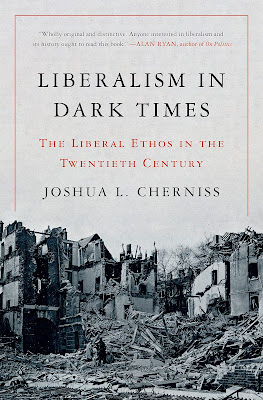I'm currently reading ”Liberalism in Dark Times” by Georgetown univerity scholar Joshua Cherniss. The book describes how a number of liberally inclined, twentieth century thinkers, including Albert Camus and Isaiah Berlin, tried to deal with anti-liberalism and totalitarism, mainly nazism and Soviet communism.
The main concern in the book is how to adress ruthlessness and cruelty without becoming so ruthless yourself that you loose your liberal essence and soul. That is: how do I fight, stop and if necessary kill bad guys while not staining my own hands, becoming as bad as they are. Liberalism should after all be based on law, individual rights, tolerance, acceptance of diversity and freedom of speech. These questions are very urgent also today, as democratic societies wrestle with an openly aggressive and repressive Russia as well as with internal, populistic lies and organized crime.
There are however no simple solutions, as there seldom are in non-totalitarian politics. Cherniss leans towards liberalism founded in ethos, that is a personal conviction of liberal norms, rather than having liberalism rest on ideology. The problem with the latter is that it often slips into expedience; ”the end justifying the means”. You've been brutalized, so you're justified to be brutal in turn. In Star Wars, you would turn to ”the dark side of the force”. Instead Cherniss wants you to retain your soul and resist the temptation to quick and dirty fixes. This is not simple, but perhaps the only way. I wrote a blog post (in Swedish) on a simliar subject: that extreme positions tend to get stuck and inflexible, while interesting development only takes place in the instable balance point between them. I compared this position to the equivalence point in chemical titration, where small changes yield major effects.
Liberalism in my fantasy writing
I'm currently working on two expansions to Free League's role-playing game Forbidden lands as well as writing a fantasy novel in the game setting that I had the pleaure of constructing. Cherniss' book has given me unexpected and useful input. In the game you meet ”The Rust Church”, a fascist religious organization. What I learned from the book is that many (not all) early Soviet communists and German nazis started out in good faith; that they solidly believed themselves working for a good cause. Being part of nonliberal movements, they however were told that their personal opinions and comforts would have to be sacrificed for the greater, common good. Indeed, the weak of stomach had to prove their loyalty by demonstrating cruelty and abscence of empathy – ”Squeamishness is the Crime” as is the title of the first chapter. Once this threshold had been overstepped, people could stand working in prison camps. I like giving my bad guys some kind of rationality rather than just being sadistic and ”bad”, so I'll probably use similar mechanisms for the Rust church. Add some historicism – the belief that your cause inevitably will prevail, and that anything implying the contrary is fake and heresy – and you're set for disaster. As Bolshevism had it: good can issue from evil.
For liberal champion, I will use the elf Mergolene from the game, advocating moderation, respect, coexistence and reasoning to fellow elves that feel justified in raiding and killing the orchs at The Eye of the Rose, a fortress once built by elves. Mergolene will probably be the protagonist of the second novel in my series. The more aggressive elves will advocate the temptations theatening fed-up liberals.
By reading and using books on history and political theory, I get the opportunity to discuss and adress current problems in our own world while writing about fantasy stuff in made-up lands.
Simply the best of two worlds!














